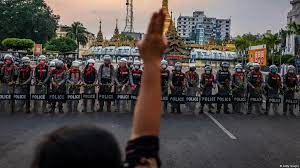Dr. Azeem Ibrahim
Myanmar’s civil war is complex and murky. Media coverage is sharply limited. Journalists are heavily controlled within the country and foreign reporters are largely not permitted to enter. This is just the way the junta, which has been running Myanmar since its coup in 2021, likes it. It would rather the world get confused and bored, so it can be left to do what it does best: Fighting internal enemies from the country’s ethnic minorities.
Those details that have escaped the country’s news filter are distressing. Like all asymmetric warfare, civilians appear to be suffering the most. Accused of harboring militia members or supporters of the People’s Defense Forces, villages are descended upon by military forces, aggressively raided and sometimes razed to the ground. The army has attacked schools and village halls. In the crossfire, in numerous engagements, village elders and innocent women and children have been shot. This story has been repeated across Myanmar. It is a story of terrible, unceasing violence, over which the outside world has little purchase. It is a war by an army against a whole nation that seems impossible to stop.
Around all of this swirls the fog of war. Outside analysts strain to see. Which forces are based where, who has which weapons, which armed group is likely to have committed which crime? These questions are difficult to answer and, in the absence of any influence, they can force outside countries into silence or passivity. If there is nothing we can know for certain, some think, there is nothing we can reasonably do to help.
The fact that the war is opaque and complex helps war criminals. Provided they win the war, they will not be held accountable. They will not end up in court if they succeed. This incentivizes brutality and duplicity – if one wins the war brutally, one will not be punished for being brutal. Unable to understand, many foreign politicians cease trying. They move on and focus on other things.
But opacity and complexity should not be fatal to understanding the war and attempting to bring about a just conclusion. It may just be that another tack is necessary; one that is already in motion, already making slow and incremental gains, and is pursuing a just end that is already in sight. The war was preceded by an act of open genocide against a minority that still languishes in refugee camps in another country. The Rohingya were forced from their villages and their homes, uprooted from their backgrounds and their lives. The Rohingya are still suffering in Bangladesh, where they live in squalid and hopeless conditions. Practical help is vitally needed but it is not arriving.
Beyond that, the legal movement that aims to secure them justice proceeds slowly and steadily. An international law case, brought in the International Court of Justice, is proceeding. It has already found that it has the standing to assess the Myanmar military’s handling of the 2017 expulsions, the destruction of villages and the murders of civilians. In a case brought by Gambia, the International Court of Justice, a UN body, is now assessing whether the Myanmar government and its military broke the genocide convention. If Myanmar is found to have done so, justice can begin to be examined and, with a slow arc, it can begin to be served. Many of the leaders of the Myanmar junta were instrumental in the alleged genocide. They used the same tactics and rationale in 2017 as they do now. To find them guilty and culpable of crimes committed at that time would be a dramatic step toward peace and justice in Myanmar.
Justice for one is justice for all. That is the old saying. However, there are some practical problems with this. If the Myanmar military is able to continue victimizing its domestic enemies, they cannot be immediately saved by a verdict against the junta in the International Court of Justice. But investigations that are well conducted will bear fruit. They limit the options of those who commit abhorrent international crimes. Justice for the Rohingya may seem a long way away while they languish in squalor and misery in Bangladeshi camps. But if the international judicial effort proceeds, justice comes closer nonetheless. Myanmar’s war is still opaque. But justice – at least for those evicted from the country by the same force of brutality that is now attempting to cling to power – may be justice for all who live there or who wish to do so again.







